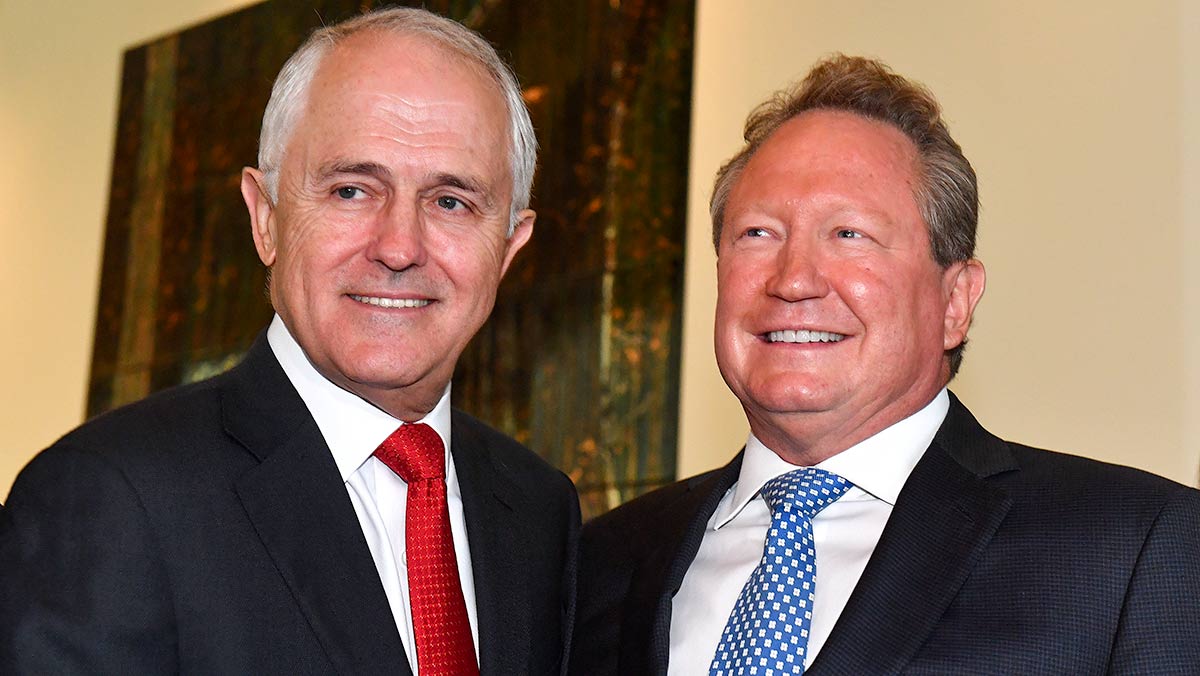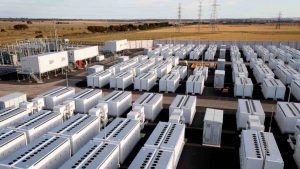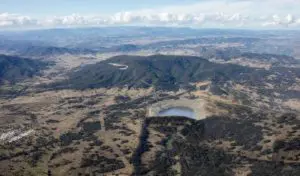Former prime minister Malcolm Turnbull and resources billionaire Andrew Forrest have joined forces to launch a new group that will advocate for the emerging hydrogen industry to focus solely on production using renewable energy.
The pair officially launched the Green Hydrogen Organisation on Thursday night as part of the New York Climate Week. They said that the new group would advocate for a global focus on hydrogen production using renewable energy, saying that ‘blue’ hydrogen – produced using fossil fuels – was a distraction.
Turnbull and Forrest were both critical of carbon capture and storage technologies, which they said had failed despite receiving huge amounts of government support, adding that industry must resist fossil fuel industry efforts to grow the amount of hydrogen produced using coal and gas.
“This is an organisation with a global mission to ensure that only green hydrogen is given the recognition as being the fuel of the future because the alternatives result in more emissions and actually tend to defeat the object of decarbonising the global economy,” Turnbull said during the launch.
“Hydrogen is the answer, but only if it is produced with renewable energy. If hydrogen is produced from gas or coal or with electricity generated by burning gas or coal, there is nothing clean about it,” he said.
“Now the fossil fuel sector, regrettably, but predictively has a vested interest in persuading us that they can produce so-called clean or blue hydrogen.”
Turnbull hit out at carbon capture and storage technologies, as Forrest has done previously, in direct contrast to the federal government, which is now pushing it as part of its technology roadmap and as a legitimate component of “blue hydrogen” made with gas.
“Carbon capture and storage has received billions of dollars in support over many years. There were high hopes for it,” Turnbull said.
“I had high hopes for it when I was Australia’s environment minister back in 2007. But it simply has not worked. It does not work consistently. In fact, it only works in very niche areas. And it’s failed. Blue hydrogen is a delaying exercise that we have to resist.”
In supporting the creation of the Green Hydrogen Organisation, Forrest – who has an estimated net worth of around $27 billion – said that he had not fully appreciated the threat posed by climate change at the time of forming Fortescue Metals, but had grown to appreciate the impact that major industrial consumers of fossil fuels were having on the environment.
“When I started the company, I didn’t really know a great deal about global warming. It was starting to be spoken about, of course, but it wasn’t taken seriously,” Forrest said.
“There was no societal expectations at all that you’d ever set up a huge industrial company, not using oil and gas, diesel and coal.
“But… I became serious about trying to understand global warming. So seriously, in fact, I sent myself back to school, I did a PhD in marine ecology.
“I began to understand that global warming literally has the oceans regurgitate its oxygen, it becomes barren… what we see just in the Anthropocene are major impacts now from climate warming, happening before our very eyes” Forrest added.
The organisation was launched as part of the New York Climate Week, timed to coincide with a meeting of the United Nations General Assembly.
Several world leaders have used the UN meeting to strengthen their commitments to cutting global greenhouse gas emissions, including a commitment from Chinese leader Xi Jinping to cease his country’s support for the overseas construction of new coal fired power stations.
On Wednesday, China’s hydrogen industry body, which is supported and supervised by the government, called for 100GW of green hydrogen electrolysers by 2030 – a target that Forrest has in mind for his own green hydrogen ambitions.
However, Australian prime minister Scott Morrison has made no new commitments, revealing that his government has yet to reach a position on whether it will join a number of key international allies in adopting a zero net emissions pledge for 2050.
Forrest made clear that he sees decarbonisation as the future of Australian, and international, industry.
“There is now an opportunity to use our industrial might – the fact that [Fortescue is] a heavy carbon-emitting company to use that as an example – to drive a wedge between the argument that if you’re a company, which society depends upon but you’re also heavy carbon emitter, then you have to still stay a heavy carbon emitter. That is a fallacious argument,” Forrest said.
Forrest also lamented the amount of funds spent on unsuccessful carbon capture and storage projects.
“Carbon sequestration has robbed the economies of the world of more money than any bank robber ever possibly could, then you’ll realise because it simply doesn’t work,” Forrest said.
Turnbull is already collaborating with Forrest through the latter’s clean energy spin-off – Fortescue Future Industries – which will drive the resources company’s push into renewable energy and green hydrogen production. The intention is to see the Fortescue group of companies shift from one predominantly built around iron ore and steel, to one focused on sustainable materials and renewable hydrogen.
Turnbull was appointed as Fortescue Future Industries’ chairman in February, with the subsidiary setting itself the ambitious goal of developing 1,000GW of new renewable energy projects globally, including plans for up to 40GW in Australia. Fortescue has also committed to invest at least 10 per cent of future earnings into the ‘future industries’ business.
The new Green Hydrogen Organisation will have a presence across Australia, the United States and Europe. It will be led by the former head of the Extractive Industries Transparency Initiative, Jonas Moberg.







